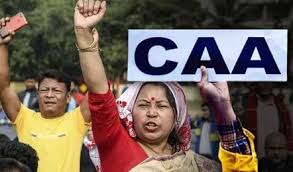By – Aditi Gupta
In spite of political attacks on the CAA during the Lok Sabha elections, the Central Government has taken a major step. Under this, the Center has begun awarding citizenship certificates. In accordance with this law, Union Home Secretary Ajay Kumar Bhalla handed citizenship certificates to 14 refugees in Delhi on Wednesday for the first time. With this, the nation’s citizenship process for over 31,000 non-Muslim refugees officially started.

Notably, one of the primary issues in the Lok Sabha elections is CAA. Not only do the opposition parties strongly dislike it, but they have pledged to repeal it should they win government. Leaders of the BJP Party claim that the opposition is misleading the Muslim population.
As promised during the elections, the BJP added CAA in its manifesto this time. The BJP began the process of granting citizenship to refugees, confirming its pledge made before the mid-elections, following the law’s adoption around two months ago.
Harish Kumar, one of the candidates who acquired citizenship certificates, stated, “I have lived in Delhi for the past 13-14 years. This is a dream come true feeling, and I am delighted. It is a new life for me…I am very thankful to the national government.
On March 11 of this year, the Citizenship Amendment Act (CAA) went into effect countrywide. The Parliament enacted the 2019 Citizenship Amendment Bill. Later on, the President supported this bill. Minorities from Pakistan, Bangladesh, and Afghanistan who are adherents of the Hindu, Sikh, Jain, Buddhist, Parsi, and Christian groups will find it simpler to obtain Indian citizenship , thanks to the CAA.
In order to confer Indian nationality to non-Muslim migrants from Bangladesh, Pakistan, and Afghanistan who arrived in India on or before December 31, 2014, the Citizenship by Agreement (CAA) was enacted in December 2019. Naturalization is one way to become a citizen under the Citizenship Act. The candidate must have lived in India for the last year and a half, as well as for the last 12 months of the previous 14 years. For those who belong to six religions (Hindu, Sikh, Jain, Buddhist, Parsi, and Christian) and three nations (Afghanistan, Bangladesh, and Pakistan), the statute stipulates up to six years rather than eleven years.
Additionally, the law specifies that in case that any regulation is broken, holders of Overseas Citizen of India (OCI) cards may have their registration terminated.

